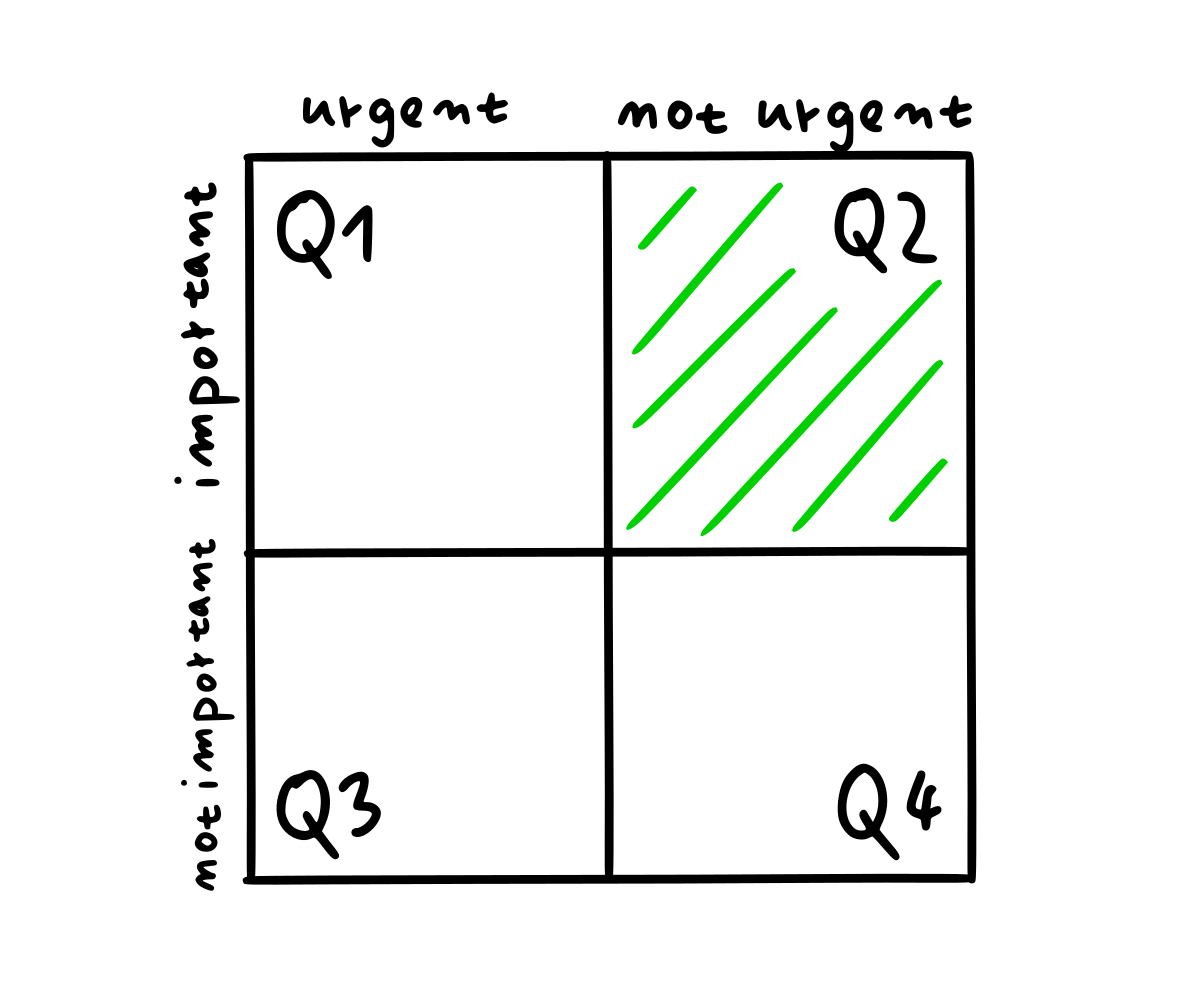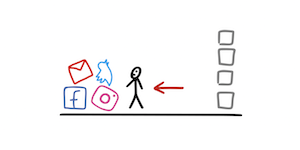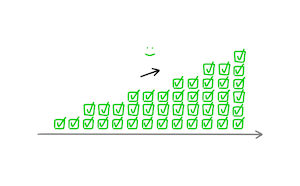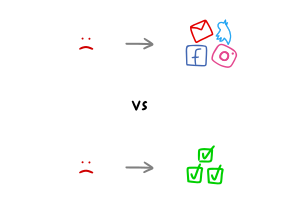How to do important but not urgent work

You have work to do, but the deadline is in a couple of weeks or months. Or you have no deadline at all.
How do you do great work every day instead of the usual last-minute push before a deadline?
A vitally important question in the era of knowledge work.
The mythical land of Q2, the important but not urgent
This post is all about the Q2 of the Eisenhower matrix - the part that many procrastinators never get around to.

It's a shame because Q2 is where all the future-focused, strategic work lies: learning new skills, investing into new endeavors, working on new branches of a business,...
Q2 is the quadrant of potential.
Without spending time in Q2 frequently, we tread water in life, doing only the things that we've always done, or that we're forced into at the last minute. Just enough to get by, but not to go to bed with a sense of pride.
Let's change this.
We'll start with the first obstacle to working on non-urgent important tasks—the reactive habit of checking.
Why checking things became a default habit
If you have Internet access, you probably developed this simple habit:
When I get bored, I check ___________.
This is a problem.
Work often isn't engaging at the beginning of a session. It can seem onerous, never-ending, and boring (before you get into the problem-solving mode).
If you always have an easy way to get distracted, you'll take it. Often.
When you check a site or app, you get a bit of dopamine - a feel-good neurochemical.
This dopamine hit makes it addictive to check stuff. Just the possibility of something new, random, or unexpected is exciting, even if that new thing ends up being a work email.
Checking things is the cornerstone of a reactive work style:
- You never do something unless it's in reply to someone else.
- You wait for others to remind you multiple times to do something.
- You refresh inboxes constantly and keep them open at all times.
- When you find yourself bored, you immediately check something.
This way of working is devoid of initiative. It's an addiction to new information disguised as being "responsive."
Nothing non-urgent ever gets done.
How can we get ourselves to do it?
2 ways to do non-urgent work
The first way is to make Q2 feel like Q1 - to make it urgent. There's a variety of ways to do it.
The second way is to choose to work on Q2 because you can.
1. Make Q2 feel like Q1
When we're on a deadline, we spring into action.
The consequences of not acting become clear: we'll get fired, fail a class, or ruin a relationship...
The fear of these scenarios is visceral. It drives us to finally get things done.
While reliance on this fear is not ideal, we can use it.
Create consequences for your actions (or lack thereof)
If you know that without a deadline, you don't work, create deadlines.
There are many ways of doing this:
- Tell your coworker you'll do something.
If you tell a coworker that you'll have done something by Tuesday, they will expect you to deliver. If you don't, you'll cause them to be disappointed or angry. That's a clear consequence. - Promise publicly you'll do something.
If you promise on social media or any other public forum that you'll do something by a certain time, you're putting your reputation at risk. - Schedule an event you don't want to miss.
If it's 3PM and you schedule a fancy dinner with your partner at 6PM, it becomes clear that you have only the next 3 hours to get things done (unless you want to miss the dinner). Having more events in your schedule highlights the space available for work. If there's little time for delays, you'll probably adapt and not delay. - Sign up for Stickk or Beeminder.
Both of these services allow you to make a financial bet against yourself. They also help you put your goals into a concrete format. Losing your own money if you don’t do something can be a powerful motivating force.
Besides these ways of creating a deadline for yourself, you can also heighten your awareness of not working when you're meant to.
Create a crystal clear sense of "Now I focus"
When a deadline is looming over us, we feel this visceral feeling of "now I really need to work."
Suddenly, every available hour is an hour we can use to work. Having so much to do and so little time to do it makes us use every minute.
In other words, it becomes crystal clear to us that now is the time to focus.
We can use other tools to get to that feeling.
Work alongside others
Our environment shapes our behavior in a profound way. Imagine you're working next to a coworker who's focusing intensely. They can also see your screen when they occasionally glance away from their work.
Would that inspire you to focus a bit more?
The research says yes. One study found that the presence of another person improves performance by 16-32%. Interestingly, the study notes: "low productivity workers are the most sensitive to the behavior of peers."
Now, if you can't use this in your physical environment and work with your coworker, or partner, you can use a service like Focusmate.
It allows you to work with 50 minute sessions with others who want to focus on their work.
You can try the service for free and see if it helps you.
Make a grand gesture

A slightly more esoteric way of boosting your awareness of "now I work" is to make a grand gesture.
Cal Newport describes this strategy in Deep Work and uses the example of J K Rowling.
When Rowling was stuck writing The Goblet of Fire, she decided to check into a 5 star hotel.
A stay in a hotel like that is expensive. You can spend hundreds of dollars every day.
For Rowling, the whole purpose of staying in that hotel was to write. If she was paying thousands of pounds every week, it heightened her awareness time passing. She was paying for every minute, so she'd better produce something worth it.
Now, this grand gesture is not available to all of us, but another is: a trip.
To help himself decide whether to start his online training program AltMBA, Seth Godin went into the desert for a few days with his friends.
He had one objective for himself: decide.
He thought about the project, wrote about it, and ultimately decided to commit and do it.
Could you take a trip somewhere as an opportunity to make a decision you’ve been putting off?
If you don't want to make yourself work using the above, the other choice is creating a routine in your life to take on non-urgent work without pressure.
2. Choosing to work now
Make time for Q2 or it won't happen
The anti-dote to reactive site and app checking is consciously blocking out big uninterrupted chunks of time.
Our mind works best when we focus on 1 task for an extended period of time, without interruptions.
If you have email or social media open at all times, you'll get interrupted.
Decide to set specific times aside
When was the last time you had 2+ hours to work on non-urgent tasks? A time when you didn’t check any distractions and had no one interrupt you?
If you have to starch your memory extensively to find an answer, then it may be time for a change.
Uninterrupted time is crucial for productivity, particularly when it comes to dealing with complex or ambiguous tasks.
It’s also crucial to specify what you’re going to work on. Without a clear intention, the urgent work and unproductive habits will take over.
The simplest way to do this is to put a big block on the calendar and put what you need to do as the title. You can also add any links or notes to the description.
When in your week can you do this? When can you make time for futures oriented, important work?
Choose to work because you can
The last point may well be the most important one. Much of our time, we don’t choose to work. We’re forced to do so by our circumstances. That puts us in a defensive position.
But we can actively choose to do work. Choose to write that email. Choose to reach out to someone. Choose to start working on the next project. Go on offense.
Fear is the default motivator for many of us. If I don't do this, I will [insert unpleasant consequences here].
There are other ways, other internal narratives that we can use.
"I'm doing this because I have the time and I'm alert and able.""I'll do this because the sooner I do it, the better.""I'll get this done now because it would be awesome if it existed."
Instead of focusing on what happens if you don't do something, focus on what happens if you do.
Switch from the fear of consequences to desire for a specific awesome version of the future.
When you do block out a 2 hour block of time and find yourself with nothing urgent to do, choose to work. Because you can. Because you want to create something awesome. Because it will make you happy at the end of the day, week, month, and year.
Don't wait until circumstances force you, go on offense now!
Summary
There are 2 main ways to get non-urgent work done:
- Make it feel urgent.
- Choose to do it.
To make work feel more urgent, you can:
Create consequences for your inaction.
- Tell your coworker you'll do something.
- Promise publicly you'll do something.
- Schedule an event you don't want to miss.
- Sign up for Stickk or Beeminder.
Make yourself hyper-aware of not taking action.
- Work alongside others with Focusmate.
- Make not taking action feel wasteful to yourself (scrolling social media in a 5 star hotel).
To choose to do non-urgent work:
- Block out big uninterrupted chunks of time for non-urgent work.
- Assign specific times to specific tasks.
- When you have the opportunity, choose to work because you can.
Pick 1 strategy out of this article and apply it today!



